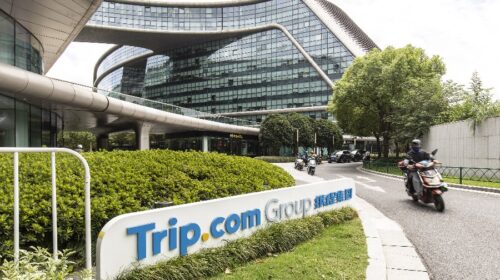CHINA BULLETIN: PMI Readings Signal Strong End to 2023


In this week’s issue New Year’s travel bounces back, Wanda sells off shopping malls and a top influencer topples a CEO. On a scale of 1 to 100, we give the week a 50 for offshore-listed China stocks.
Doug Young, Editor in Chief
You can sign up to get China Bulletin weekly in your inbox.
MACRO
PMI Readings Signal Strong End to 2023
While 2023 will probably go down as a year that China might prefer to forget, at least in terms of the economy, the end of the year saw strong upticks in the Caixin purchasing managers’ indexes (PMIs) for both manufacturing and services. The Caixin PMI for manufacturing stood at 50.8 in December, while the services PMI came in at 52.9.
The latest manufacturing figure showed expansion for a second consecutive month, defined as anything above 50, while the services figure was the strongest in five months. The data is broadly encouraging, and shows that perhaps some of China’s endless stimulus measures are starting to have some effect. But there were also notable weaknesses in areas like employment and exports.
$50 Billion Boost for Policy Banks
In the latest signal that China will turn to its old playbook of infrastructure building to stimulate its economy, the central bank injected nearly $50 billion in low-cost funds into its policy banks in the final month of 2023. Observers are interpreting the move as aimed at encouraging lending to both the infrastructure and the struggling property sectors.
Truth be told, these banks, led by the likes of China Development Bank, probably need this money more to shore up their capital, since their loans are often based on government priorities and thus are riskier than those made by true commercial banks. Beijing spent much of last year engaging in similar lending-based stimulus measures, though with seemingly limited results.
China Stocks Return to Wilting Ways
After a cryptic rally for no apparent reason to end 2023, offshore-listed Chinese stocks returned to their losing ways last week in the absence of any major news to support the market. The Hang Seng China Enterprises Index ended the week down 2.8%, while the iShares MSCI China ETF fell 3,2%. The broader Hang Seng Index also lost 3%.
In a sign of the times, foreign funds continued to flee Chinese stocks in the month of December, dumping them at their fastest rate of the year, according to new data from Morgan Stanley. China and Hong Kong equities saw a net outflow of $3.8 billion in foreign funds for the month, which was not only the biggest monthly outflow last year but also the third-biggest on record.

Industry
Travel Rebound Marches On
China’s travel rebound continued last week, even as the nation continued to try and boost international tourism that remains well below pre-pandemic levels. The country recorded a combined 1.72 million inbound and outbound trips for each of the three days of the New Year holiday, exceeding forecasts and up almost six-fold from last year.
Meantime, China announced a new program with Thailand that will allow visa-free travel between the two countries for their citizens starting in March. The aviation regulator also predicted China’s international flights could reach 80% of pre-pandemic levels by the end of 2024. That latter figure, in particular, shows just how slowly China’s international travel has been to recover post-pandemic.
Gaming Regulator Removed After Fears of New Crackdown
China rarely provides much insight into its murky world of regulation, generally posting new rules and regulations with little warning or explanation behind the process. But gaming industry watchers got some rare insight last week when a top official overseeing their sector was ousted just days after the publication of new rules that sent shockwaves through the industry.
Feng Shixin’s removal as head of the publishing unit of the Communist Party’s Publicity Department was revealed in a Reuters report citing unnamed sources. No reason was given, but the report implied that Feng had allowed the publication of new rules that led many to fear a new crackdown on the gaming sector, even as Beijing is placing greater focus on supporting the economy.
Top Banks Limit Exposure to Smaller Peers
If China experiences a banking crisis with its slowing economy, such a development is almost certain to start in its vast system of small, regional banks that are far less sophisticated than big national lenders. Reflecting such concerns, major banks have begun to more sharply scrutinize their smaller peers’ asset quality and also tighten their standards for interbank lending.
All this may sound a big vague and jargony, but the bottom line is that China is home to thousands of smaller local banks that are often beholden to local government leaders and don’t always make the best lending decisions. These banks may have become especially challenged due their status as important funding sources for all kinds of dubious projects to prop up their local economies.

Company
Wanda in Race to Tackle Debt
It’s a new year, and that means everyone is guessing who will be the next property company to follow down the default path blazed by former superstar developers Evergrande and Country Garden. One possible candidate could be Wanda, which has been selling off its signature Wanda Plaza office and shopping complexes in a bid to raise cash to service its large debt.
New information in the Tianyancha business database shows Wanda recently sold off four of its signature properties in Shanghai, Hangzhou, Suzhou and Guangzhou, following three similar sales in June. The company acknowledged last April that it was facing a cash crunch, and said it would suspend principal payments on some of its medium- and long-term bank loans.
Dubai Carmaker’s Investment in Evergrande EV Unit Stalls
In what should come as little surprise, a deal for Dubai-based carmaker NWTN to invest $500 million in the electric vehicle arm of struggling property developer Evergrande has expired. It appears the deal isn’t actually dead just yet, with reports indicating the two sides were continuing to negotiate terms of the investment, hinting at a disagreement on valuation.
Evergrande New Energy Vehicle was founded in 2019, and began selling its first vehicles in late 2022. We don’t know much about its electric SUVs, but its ties to embattled property giant Evergrande certainly can’t be too reassuring. The intense competition in China’s EV sector may also be leading NWTN to have second thoughts about the investment.
Bubble Teamakers Mixue and Guming File for IPOs
The New Year may be a time for bubbly celebrations with champagne, but two Chinese beverage companies welcomed in 2024 with other bubbles that are a signature ingredient of trendy premium tea drinks. Both Mixue and Guming, the country’s top two bubble tea chains by store count, filed for Hong Kong IPOs last week, in deals that could raise more than $1 billion combined.
Mixue is easily China’s biggest bubble tea operator with 36,000 stores, while Guming is still sizable at 9,000. Frankly speaking, we’re surprised these filings weren’t made earlier since China is filled with bubble tea operators that have been rumored to be eyeing IPOs for the last four years. To date, only a single chain, the Japanese-themed Nayuki, has managed to list in Hong Kong.
AND FROM THE PAGES OF BAMBOO WORKS
| Gracell Blazes Exit Trail for Cash-Challenged Chinese Biotechs Last week we brought you the story of Gracell Biotech, which could become a trendsetter among China’s large field of cash-challenged drug makers with a deal to sell itself to European giant AstraZeneca for up to $1.2 billion. Gracell may have felt compelled to make this deal as its cash runs low and trials for its promising high-tech cancer treatments remain in early clinical phases. The fact that the company could attract a big name like AstraZeneca could bode well for the dozens of similar Chinese startups that have little or no hope of earning big money from their drugs anytime soon, even as they rapidly burn through cash to support their R&D. We wouldn’t be surprised to see more such M&A for some of these more promising companies in the year ahead. |
| E-commerce Drama Offers Lesson on the Power of Key Influencers We also brought you the colorful tale of a showdown between livestreaming e-commerce company East Buy and its most popular host, who felt he wasn’t being given enough credit for his work. The story is quite detailed and we encourage you to read our report for all the twists and turns. But the bottom line was that superstar influencer Dong Yuhui won in his battle with CEO Sun Dongxu. Never mind that Sun was at East Buy for more than a decade, and Dong was a former English language tutor at the company in its earlier form as an online educator. Dong’s displeasure at his lack of respect sparked an uproar among his millions of fans, spotlighting the unusual risks that companies face from overreliance on such key opinion leaders. |






